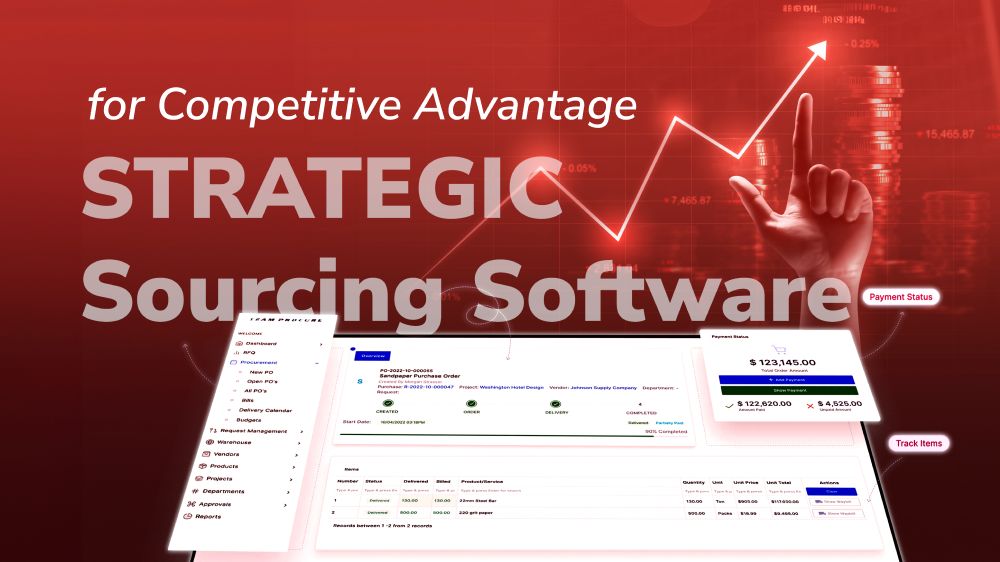Outsourcing Software Development for Startups: A Game-Changer in The Age of Digital Innovation

Content Map
More chaptersEvery successful business starts somewhere. Even giants like Facebook, Alibaba, Amazon, or TikTok had probably once faced the question of outsourcing certain aspects of their operations or letting the in-house team handle everything. As early-stage startups, it can be challenging to focus both on efficient product development and rapid market entry.
Hence, to secure success in today’s increasingly competitive market, it would be both wise and natural to go to an expert software development team to shoulder the weight during the early stages. After all, a wise man has once said: “It’s better to do one thing well than ten things poorly.” The article will provide an extensive view of software development outsourcing, including outsourcing success stories, an all-around quiz to test your existing assumptions, and the outsourcing landscape in 2024 and beyond.
Key Takeaways
- Software outsourcing is the key to unlocking additional bandwidth and expertise for startup businesses, especially in the age of relentless digital innovation.
- Startup founders need to have a clear vision of what their product will deliver before start looking for an outsourcing team.
- One of the key benefits of having experts on board is a shorter time-to-market, meaning businesses can make revenue sooner and secure a higher market share.
Real-life Outsourcing Software Development Success Stories
Many have preached the numerous benefits of software outsourcing. However, a significant number of tech startups still shy away from it, which is understandable as working with outsourcing partners isn’t easy. However, the practice is still worth considering, especially when looking at the numerous success stories of industry giants who have employed it effectively.
Whatsapp: Outsourced IT talent

One of the most well-known messaging apps experienced a rough beginning trying to establish its position in the SMS technology field. This tech had a strong grasp over its user’s habits in the early 2010s. The company found it challenging to push its competitive edge and develop its SMS technology. This is when they outsourced developers in Russia, where at the time, provided services at a lower price but with the same quality.
The result? WhatsApp is the most common messaging app, with approximately 2.4 billion monthly users. It was sold to Facebook for 19 billion in 2014. It is safe to say that the decision to outsource helped the company succeed but with the lowest cost possible.
Alibaba: Outsourced web development

In 1999, Jack Ma and his co-founders founded Alibaba in Hangzhou, China. As told in Alibaba: The Inside Story Behind Jack Ma and the Creation of the World’s Biggest Online Marketplace book, the founders of Alibaba aimed to create a website that would appeal to domestic and international customers. Even though businesses have increasingly started to use websites to appeal to customers around this time, the human resources available for this task were still scarce.
Hence, the team decided to outsource web development to developers from the U.S. The outsourced team needed to develop the website and localize the website content, not just simply translate it. This move led to the household name we know today, with a market value of $193.47 billion as of June 2024.
Skype: Outsourced back-end development

Skype, one of the office’s favorite messaging apps, was founded in 2003 by two Europeans. The founders decided to outsource the back-end development to three Estonian developers. They created the application that we all know and love today, reducing the cost of voice chats with the use of P2P protocols. One of the Estonian developers was ultimately credited as the co-founder of Skype. After two years of establishment, Skype was acquired by eBay and, later, by Microsoft. As of 2020, Microsoft reported that Skype has 44 million monthly active users.
Slack: Outsourced app and web design

Companies not only outsource software development but also hire offshore development teams to improve the user experience and web design. Slack is one such example. The team in its early days hired a company from Canada to help them with web design and beta testing - which ultimately helped them obtain crucial feedback to create one of the most well-known messaging app. The revenue generated by Slack in 2022 was $1.5 billion.
Everything You Need to Know to Outsource Software Development Successfully - A Quiz
Outsourcing, even with all the benefits of cost-cutting and extensive expertise, is often not as straightforward as many want it to be. Therefore, it is best to equip yourself with the necessary knowledge before hopping on Google and simply typing in “The best software development company”, “custom software development”, or “software outsourcing companies”. Here is a quiz to help you solidify everything you need to know before jumping into the outsourcing journey as a startup.
Benefits of Software Outsourcing

Question 1: What is the primary reason startups may choose to outsource IT functions?
- A. To improve their company image
- B. To hire a full-time employee
- C. To evaluate specialized skills and knowledge that may not be available locally
The correct answer is C.
Hiring the right talents in the tech industry is challenging, especially if it is a niche sector. Not only is the process time-consuming and difficult, but it often is also costly, which puts more pressure on the budget. Hence, having access to the essential expertise and skills in established software development companies, even if it is on a temporary basis, is a cost-effective and smart solution.
Question 2: Why is it important to define the vision and scope of your software idea before reaching out to a software development company?
- A. To solidify a plan for your project and help the company understand your vision
- B. To create a good marketing and sales plan
- C. To plan out the design of the software early on
The correct answer is A.
In addition to your scope and vision, think about the product’s key features and functions, what pain point you are trying to help your users solve, who your target audiences and competitors are, etc. You can reach out to the team of software developers first, but try to work out the details of what you are trying to achieve with the product. Don’t worry too much about the technical details, as the professionals will have got you covered.
Question 3: How can outsourcing free up time and resources for a startup’s in-house team?
- A. By reducing the number of meetings
- B. By eliminating the need for advertising
- C. By enabling the in-house team to concentrate on other core business activities
The correct answer is C.
Instead of spreading human resources thin to manage multiple tasks at once, the most beneficial aspect of startup outsourcing software development is allowing them to focus on activities that push business growth like advertising, promotion, in-depth market research, customer satisfaction, and brand recognition.
Question 4: What is the role of a well-qualified software development team in a startup?
- A. Handle administrative tasks efficiently
- B. Help turn product ideas into reality quickly while ensuring quality
- C. Focus solely on marketing strategies
The correct answer is B.
It is crucial to enter the market quickly in today’s competitive market. This allows you and your team to quickly obtain feedback from the users and make adjustments, as well as further penetrating the market. Fast market entry also aids in the startup’s establishment of a presence and a footing, both of which are essential for future market penetration and success.
Question 5: How does software development outsourcing help clients complete their IT tasks?
- A. Swiftly and at high-performance standards
- B. By increasing the cost of the process
- C. Slowly and with low-quality standards
The correct answer is B.
Credible outsourcing firms have an established development process and methodologies in place. Additionally, with access to the top tech talents in the industry, they can produce high-quality software in a shorter time.
Challenges of Outsourcing
Question 1: Which of the following is a challenge that founders of startups often face?
- A. Hiring a marketing team
- B. Bringing their idea to market with a limited budget and timeframe
- C. Choosing the right office location
The correct answer is B.
Startups often face the hurdle of entering the market quickly with their new ideas and limited financial resources and time. This often adds pressure to the business strategy and hiring decisions.
Question 2: When building a new tech idea from the ground up, what is one of the biggest, yet under-discussed challenges for startup companies?
- A. Marketing the product
- B. Overcoming various technical aspects of the project
- C. Hiring sales staff
The correct answer is B.
Oftentimes, the biggest challenge of a startup isn’t coming up with innovative ideas but the lack of technical expertise. Startups often lack much of the necessary technical knowledge to bring the idea to fruition or may have a hard time finding the right experts to work in-house. Having the right software development company onboard will solve this problem and even elevate your idea.
Best Practices for Software Outsourcing

Question 1: In terms of technical needs, what should you pay attention to when choosing a software development company?
- A. The company’s logo design
- B. The company’s location and press releases
- C. The company’s expertise in relevant technologies and platforms
The correct answer is C.
In order to shorten the time to market and release a viable product on the target platforms, consider where the company’s expertise lies. For example, if you want to release a mobile app, look for companies with successful mobile development projects.
Question 2: Why is it important to define the vision and scope of your software idea before reaching out to a software development company?
- A. To solidify a plan for your project and help the company understand your vision
- B. To create a good marketing and sales plan
- C. To plan out the design of the software early on
The correct answer is A.
In addition to your scope and vision, think about the product’s key features and functions, what pain point you are trying to help your users solve, who your target audiences and competitors are, etc. You can reach out to the team of software developers first, but try to work out the details of what you are trying to achieve with the product. Don’t worry too much about the technical details, as the professionals will have got you covered.
Question 3: What is a key factor in determining a software development company’s expertise?
- A. Their office size
- B. Their portfolio and track record
- C. Their company name and website
The correct answer is B.
Checking the company’s portfolio and track record helps us understand their experience and capability in delivering successful projects similar to yours.
Question 4: Why is having a legally binding NDA important when outsourcing IT functions?
- A. To protect sensitive information and intellectual property
- B. To reduce project costs
- C. Because every other company has an NDA
The correct answer is A.
One of the biggest concerns when working with an outsourcing partner is control over information security. Confidentiality of any private information disclosed with the vendor is guaranteed by a Non-Disclosure Agreement (NDA). The startup’s procedures, data security, and intellectual property all depend on this legal protection.
Question 5: Why is establishing clear communication channels with your outsourcing provider crucial?
- A. To reduce the number of meetings
- B. To ensure effective collaboration and avoid misunderstandings
- C. To set up a social media campaign
The correct answer is B.
Having clear communication protocols in place makes sure all the relevant stakeholders are on the same page, preventing misunderstandings and unwanted delays while facilitating smooth project execution.
Question 6: It is crucial to align business objectives with outsourcing goals. Why is that?
- A. To delay the project indefinitely
- B. To create unnecessary complications
- C. To ensure a coherent strategy and successful project outcome
The correct answer is C.
Something to keep in mind is the transparency of your business objectives and outsourcing goals. By being clear about what your company wants, you ensure that the roadmap is clear and everyone knows exactly what they need to do.
Additional Note
Do you still need to do more research about software outsourcing? Orient Software has a list of comprehensive blog posts to help you get started, from the list of the best outsourcing companies, a detailed explanation of the advantages and disadvantages of software development outsourcing, to the most common outsourcing models every startup founder needs to know.
You can always directly reach out to Orient Software, too. We are happy to answer your outsourcing questions.
Software Development Outsourcing Landscape in 2024
The digital landscape is developing in leaps and bounds; hence, new technology trends are emerging every year. The year 2024 is no different and entails a number of IT trends that constantly push the industry forward.
One common theme among the upcoming trends, namely generative AI, Augmented and Virtual Reality, Internet of Behaviors (IoB), Green Cloud Computing and more has revealed the need for specialized technology capabilities. These specialized capabilities are harder and harder to find in-house, and the local talent shortage often adds to the existing challenges.
Hence, despite the seemingly hard work and thorough preparation needed each time one searches for a credible outsourcing partner, outsourcing software development is likely to prevail. There are many reasons behind this, but the main one is the extra bandwidth it provides startup founders in the age of relentless digital innovation. Access to specialized capabilities, local talent shortages, cost-efficiency, and innovation agility are some additional reasons for the integral role software development outsourcing plays in most industries today. In short, it is gradually becoming a necessity for a business’s survival and competitive edge.







